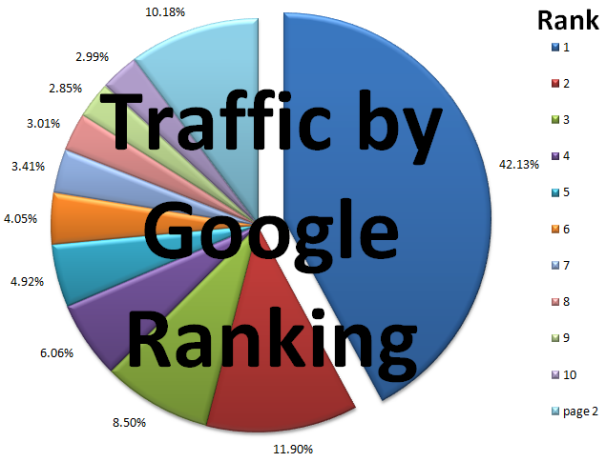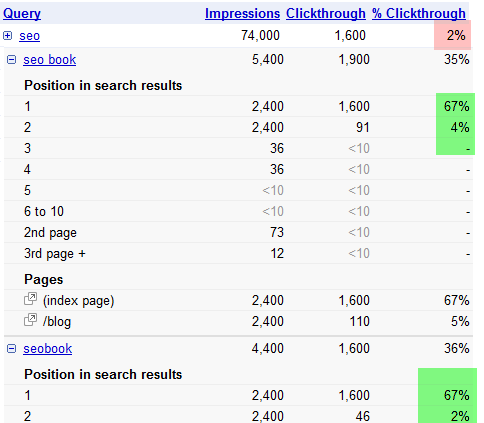Generally I have not been a huge fan of registering all your websites with Google (profiling risks, etc.), but they keep using the carrot nicely to lead me astray. :D ... So much so that I want to find a Googler and give them a hug.
Google recently decided to share some more data in their webmaster tools. And for many webmasters the data is enough to make it worth registering (at least 1 website)!
AOL Click Data
When speaking of keyword search volume beakdown data people have typically shared information from the leaked AOL search data.

The big problem with that data is it is in aggregate. It is a nice free tool, and a good starting point, but it is fuzzy.
Types of Searches
There are 3 well known search classifications: navigational, transactional, and informational. Each type of query has a different traffic breakdown profile.
- In general, for navigational searches people click the top result more often than they would on an informational search.
- In general, for informational searches people tend to click throughout the full set of search results at a more even distribution than they would for navigational or transactional searches.
- The only solid recently-shared publicly data on those breakdowns is from Dogpile [PDF], a meta search engine. But given how polluted meta search services tend to be (with ads mixed in their search results) those numbers were quite a bit off from what one might expect. And once more, they are aggregate numbers.
Other Stuff in the Search Results
Further, anecdotal evidence suggests that the appearance of vertical / universal results within the search results set can impact search click distribution. Google shows maps on 1 in 13 search results, and they have many other verticals they are pushing - video, updates, news, product search, etc. And then there are AdWords ads - which many searchers confuse as being the organic search results.
Pretty solid looking estimates can get pretty rough pretty fast. ;)
The Value of Data
If there is one critical piece of marketing worth learning above all others it is that context is important.
My suggestions as to what works, another person's opinions or advice on what you should do, and empirical truth collected by a marketer who likes to use numbers to prove his point ... well all 3 data sets fall flat on their face when compared against the data and insights and interactions that come from running your own business. As teachers and marketers we try to share tips to guide people toward success, but your data is one of the most valuable things you own.
A Hack to Collect Search Volume Data & Estimated CTR Data
In their Excel plug-in Microsoft shares the same search data they use internally, but its not certain that when they integrate the Yahoo! Search deal that Microsoft will keep sharing as much data as they do now.
Google offers numerous keyword research tools, but getting them to agree with each other can be quite a challenge.
There have been some hacks to collect organic search clickthrough rate data on Google. One of the more popular strategies was to run an AdWords ad for the exact match version of a keyword and bid low onto the first page of results. Keep the ad running for a while and then run an AdWords impression share report. With that data in hand you can estimate how many actual searches there were, and then compare your organic search clicks against that to get an effective clickthrough rate.
The New Solution
Given search personalization and localization and the ever-changing result sets with all the test Google runs, even the above can be rough. So what is a webmaster to do?
Well Google upgraded the data they share inside their webmaster tools, which includes (on a per keyword level)
- keyword clickthrough rank
- clickthrough rate at various ranking positions
- URL that was clicked onto
Trophy Keywords vs Brand Keywords
Even if your site is rather well known going after some of the big keywords can be a bit self-defeating in terms of the value delivered. Imagine ranking #6 or #7 for SEO. Wouldn't that send a lot of search traffic? Nope.
When you back away the ego searches, the rank checkers, etc. it turns out that there isn't a ton of search volume to be had ranking on page 1 of Google for SEO.

With only a 2% CTR the core keyword SEO is driving less than 1/2 the traffic driven by our 2 most common brand search keywords. Our brand might not seem like it is getting lots of traffic with only a few thousand searches a month, but when you have a > 70% CTR that can still add up to a lot of traffic. More importantly, that is the kind of traffic which is more likely to buy from you than someone searching for a broad discovery or curiosity type of keyword.
The lessons for SEOs in that data?
- Core keywords & raw mechanical SEO are both quite frequently heavily over-rated in terms of value.
- Rather than sweating trying to rank well for the hardest keywords first focus on more niche keywords that are easy to rank for.
- If you have little rank and little work to do then there is lots of time to focus on giving people reasons to talk about you and reference you.
- Work on building up brand & relationships. This not only gives your link profile more karma, but it sends you a steady stream of leads for if/when you fall out of favor a bit with the search engines.
Those who perceive you well will seek you out and buy from you. But it is much harder to sell to someone who sees you as just another choice amongst many results.
Search is becoming the default navigational tool for the web. People go to Google and then type in "yahoo." If you don't have a branded keyword as one of your top keywords that might indicate long-term risk to your business. If a competitor can clone most of what you are doing and then bake in a viral component you are toast.
Going After the Wrong Brand Keywords
Arbitraging 3rd party brands is an easy way to build up distribution quickly. This is why there are 4,982 Britney Spears fan blogs (well 2 people are actually fans, but the other 4,980 are marketers).
But if you want to pull in traffic you have to go after a keyword that is an extension of the brand. Ranking for "eBay" probably won't send you much traffic (as their clickthrough rate on their first result is probably even higher than the 70% I had above). Though if you have tips on how to buy or sell on eBay those kinds of keywords might pull in a much higher clickthrough rate for you.
To confirm the above I grabbed data for a couple SEO tool brands we rank well for. A number 3 ranking (behind a double listing) and virtually no traffic!

Different keyword, same result

Informational Keywords
Link building is still a bit of a discovery keyword, but I think it is perhaps a bit later staged than just the acronym "SEO." Here the click volume distribution is much flatter / less consolidated than it was on the above brand-oriented examples.

If when Google lowers your rank you still pull in a fairly high CTR that might be a signal to them that your site should rank a bit higher.
Enough Already!
Enough about our keywords, what does your keyword data tell you? How can you better integrate it to grow your business?


